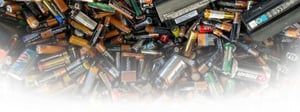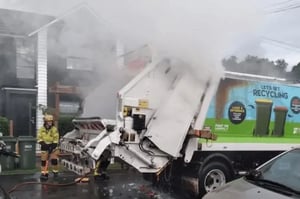
Small battery environmental scan project
Background
WasteMINZ is undertaking a project to provide an overview of the challenges facing the small battery sector in Aotearoa New Zealand - from the point of manufacturing to end of life and disposal.
There are many issues surrounding small batteries in Aotearoa New Zealand, including the increasing number of battery-related fires in New Zealand’s recycling and waste sectors caused by incorrectly disposed of batteries.
However, disposal is just one piece of the puzzle. Other challenges include:
- Lack of national standards for storage and collection
- Inconsistent classification as a hazardous substance
- Growing risks and issues around fires, infrastructure, and vehicle damage, health and safety, and increasing likelihood of longer-term environmental damage
- No obligation for organisations selling or importing batteries to take responsibility for them at the end of their life.
- A lack of product stewardship in place for small batteries, so disposal costs fall on taxpayers and ratepayers.
- Lack of data of the scale of the problem.
- Lack of onshore recycling facilities to process both used and damaged small batteries.

About the project
This environmental scan will aim to provide an overview of the small battery situation in Aotearoa New Zealand - from the point of manufacturing to end of life and disposal. In doing so, it will capture the challenges and issues the sector faces and, where possible, outline possible solutions or recommendations.
The issues around small battery recycling and disposal are significant and have been widely discussed both within New Zealand and worldwide. It is a complex issue that involves multiple stakeholders and challenges throughout the life-cycle of a small battery. These all require solutions to be identified and implemented.
The report will be limited to small batteries, including button batteries through to rechargeable battery packs for tools, and items with encased batteries (under 5kg) and e-scooters. Batteries covered by the large battery product stewardship scheme will be out of scope.
This project is being supported by funding gratefully received from the Ministry for the Environment.

Project approach
The project will comprise the following pieces of work:
- Stakeholder workshops – open invite workshops with the different stakeholder groups across the small battery life cycle providing an opportunity to raise issues, discuss key priorities and challenges, and raise possible solutions. Workshops are now complete.
- Fire statistics – surveys to compile statistics on battery (or battery related) fires in New Zealand.
- Consolidation of other research or supporting information – consolidation and review of other sources of data or information, what is happening overseas regarding their product stewardship models, and small battery related initiatives within NZ.
- Environmental scan report – development of a small battery sector environmental scan report consolidating the information obtained in the above stages.

Project timeline
- August 2025: Consultant confirmed – WasteMINZ have completed an RFP process and selected Eunomia to work with us on this project.
- September/October 2025: Stakeholder workshops.
- September/October 2025: Surveys, research and consolidation is undertaken
- November/December 2025: Peer review and draft report reviewed for feedback.
- January/February 2026: Consolidation of report feedback and final report completed.
- March 2026: Report published - final date TBC

Batteries in the news
New Zealand
- Lithium battery fires being lit to tackle rubbish truck blazes
- Why batteries keep causing fires – and how the problem can be fixed
- Auckland Council urging correct disposal of lithium-ion batteries after Glenfield fire | RNZ News
- EV Battery Fires Expose New Zealand Regulatory Gap | Scoop News
- Fires linked to lithium batteries have doubled. Why the delay in dealing with them? | RNZ News
Australia






